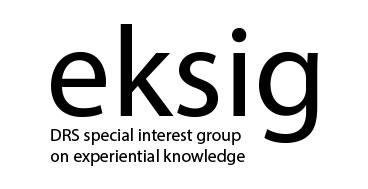Aims
Experiential Knowledge Special Interest Group
An interest in knowledge in the creative industries has developed from several sources over a number of years. Its genesis was perhaps in the deliberations of the CNAA that modified PhD degree regulations to include design practice as a significant part of the research process. Since then, debates about knowledge in research, about what we mean by a "contribution to knowledge" and how new knowledge advances the field, have developed a significance of their own. The notion of practice-based or practice-led research has become a hotly contested area, with further debates promoted through, for example, the series of conferences 'Research into Practice' and the 'Doctoral Education in Design' conferences, as well as journal special editions. Since 2007, EKSIG has organised its biennial conferences on Experiential Knowledge.
Definitions of knowledge and the contribution to the published corpus have significant implications for doctoral examination, and for peer review of research generally. A central interest of EKSIG is the clarification of research requirements, such as the contribution to knowledge, in relation to the aims of research and professional practice to advance respective fields. At the heart of this is a concern with the integration of explicit and tacit knowledge in order to accommodate the complex knowledge of practice within research, including propositional, procedural, and experiential knowledge.
The main aims of EKSIG are:
-
Investigate and advance the understanding of 'knowledge' and 'contribution to knowledge' in design research, especially in areas where designing forms part of the research process
-
Develop principles and criteria of research in design for employing different kinds of knowledge and means for the communication of knowledge
-
Promote the implementation of such principles and criteria within current research policy to promote quality and standards in research
-
Promote the implementation of such principles and criteria within research practice through the development of appropriate methodology to promote quality and best practice in research
EKSIG will seek to address these issues through a number of ways. It will:
-
Provide an identifiable focus for researchers with interests in experiential knowledge related to design
-
Provide a forum for debate through a dedicated jiscmail discussion list
-
Provide a recognised outlets for research, for example through an EKSIG conference strand at DRS conferences, seminars, or other related events
-
Promote collaborative research and its dissemination
